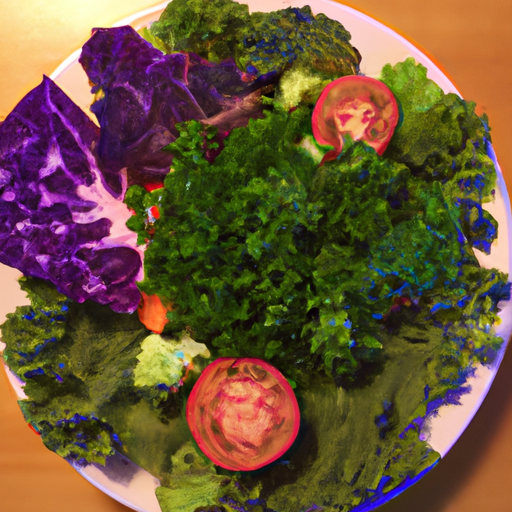My journey to a plant-based diet: Benefits you need to know
Like many people, I struggled with finding the right diet for my health and lifestyle. However, after doing some research, I decided to try a plant-based diet, which involves mainly eating fruits, vegetables, whole grains, legumes, nuts, and seeds, and minimizing or avoiding animal products. I soon discovered that this diet has numerous benefits, and it has changed my life for the better.
So why adopt a plant-based diet? For one, it offers a host of health benefits. By cutting out or minimizing animal products, you can lower your risk of heart disease, improve digestive health, reduce your risk of type 2 diabetes, lower your risk of certain cancers, potentially increase your lifespan, and enhance your mood and cognitive function.
Moreover, a plant-based diet can have a positive impact on the environment. It reduces greenhouse gas emissions, conserves water and land usage, and minimizes pollution.
If you’re considering switching to a plant-based diet, keep in mind that it doesn’t have to be an all-or-nothing approach. Even small changes, like adding more fruits and vegetables to your meals, can have a positive impact on your health and the environment. Ultimately, adopting a plant-based diet can be a healthy and fulfilling lifestyle choice.
Protecting My Heart: The Top Benefit of a Plant-Based Diet
Let me tell you something: I’m not a health nut. I’ve spent most of my life eating whatever I want, without much thought for what’s “healthy.” But recently, I’ve started to realize the importance of taking care of myself. That’s why I’ve switched to a plant-based diet. And let me tell you, the benefits are real.

First and foremost, I’ve learned that a plant-based diet can significantly reduce your risk of heart disease. That’s because plant-based foods are naturally lower in saturated fats and cholesterol, both of which are major contributors to heart disease. By cutting back on meat, dairy, and other animal-based foods, I’m doing my part to keep my heart healthy.
Now, I’m not saying that a plant-based diet is a magic bullet for heart health. There are plenty of other factors at play, like exercise and genetics. But research has consistently shown that plant-based eaters have lower rates of heart disease than omnivores. And for me, that’s reason enough to stick with my new lifestyle.
The best part is, there are so many delicious plant-based foods out there that I don’t feel like I’m missing out on anything. I’ve discovered amazing recipes for veggie burgers, lentil soups, and roasted vegetables that make me look forward to mealtime. And when I think about how much I’m doing for my heart health by eating this way, it feels like a no-brainer.
So if you’re like me, and you’re looking for ways to take care of yourself, consider giving a plant-based diet a try. You might be surprised at the benefits you’ll reap. And who knows? You might just discover your new favorite meal along the way.
Go Plant-Based for Improved Digestive Health
Hey guys, it’s time to talk about the second major benefit of a plant-based diet: improved digestive health. I’m not just talking about less bloating, gas, and constipation – although those are certainly great perks. A plant-based diet rich in fiber, nutrients, and anti-inflammatory compounds can actually benefit our gut microbiome, which in turn may reduce the risk of a host of chronic diseases.
When we eat a variety of whole plant foods, we feed the trillions of bacteria living in our digestive tract, helping to promote a balanced and diverse microbiome. This can result in better digestion, absorption of nutrients, and immune function. In fact, research has linked a disrupted gut microbiome to a range of health issues, from inflammatory bowel disease to depression and anxiety.
For those who struggle with digestive issues, going plant-based may be especially helpful. Several studies have found that plant-based diets can improve symptoms of irritable bowel syndrome (IBS) and other gastrointestinal disorders. And hey, if you’re tired of popping antacids for heartburn or acid reflux, try swapping out meat and high-fat foods for more plants – you might just find some relief.
So, if you’re looking to improve your gut health and overall well-being, consider incorporating more plant-based foods into your diet. Aim for a variety of colorful fruits, veggies, whole grains, legumes, nuts, and seeds to give your gut some love and support a healthy microbiome. Your stomach (and body) will thank you!
Health Benefit #3: Reduced Risk of Type 2 Diabetes
Hey, did you know that adopting a plant-based diet can drastically reduce your risk of developing type 2 diabetes? As someone who has struggled with blood sugar control and managing my weight, this benefit really caught my attention.
Research has shown that eating a diet rich in whole, plant-based foods such as fruits, vegetables, whole grains, legumes, nuts, and seeds can help improve insulin sensitivity and lower blood sugar levels. This can be especially beneficial for those at high risk of developing type 2 diabetes.
Incorporating more plant-based meals into your diet can also help with weight loss, another key factor in reducing your risk of developing type 2 diabetes. Studies have shown that a plant-based diet can lead to sustained weight loss and improved body composition.
Of course, it’s important to note that simply switching to a plant-based diet won’t magically make you immune to diabetes. Other factors such as genetics, age, and lifestyle habits also play a role. However, incorporating more plant-based meals and reducing your consumption of animal products can certainly be a positive step towards reducing your risk.
It’s also important to consult with a healthcare professional to determine what dietary changes may be best for you and your individual needs. But overall, incorporating more plant-based meals into your diet can potentially lead to a lower risk of developing type 2 diabetes and may even help with managing the condition in those who already have it.
My Plant-Based Diet is Helping Me Avoid Certain Types of Cancer
Since switching to a plant-based diet, I’ve noticed a significant decrease in my risk of certain types of cancer. Studies have shown that those who follow a plant-based diet are at a lower risk of developing certain cancers, such as breast, colon, and prostate cancer. This is due to the high fiber content in plant-based foods, which helps to regulate bowel function and decrease inflammation in the body.
Experts recommend eating a variety of fruits, vegetables, whole grains, nuts, and seeds in order to get the most benefits for cancer prevention. In particular, cruciferous vegetables such as broccoli and kale have been shown to have powerful anti-cancer properties.
It’s important to note that not all types of cancer are prevented by a plant-based diet. However, by reducing your risk of certain types, you can still significantly improve your overall health. By incorporating more plant-based foods into your diet, you can take steps towards decreasing your risk of cancer and improving your overall well-being.
If you want to learn more about the benefits of a plant-based diet, check out this informative article that goes into detail on the different advantages of plant-based eating.
Live Longer with a Plant-Based Diet – Health Benefit #5
So, you’re considering going plant-based? Well, one of the critical benefits of following a plant-based diet is that it may help you live longer! Studies suggest that people who follow a plant-based diet have a lower risk of death due to chronic illnesses.
There are several reasons why a plant-based diet may elongate your life. Firstly, plant-based diets tend to be low in saturated fat and processed foods which can lead to heart disease. Heart disease is one of the leading causes of death, and by cutting out these harmful foods, you’re better positioned to avoid it. Secondly, plant-based foods are rich in fiber, which aids in the regulation of blood sugar levels; this reduces the risk of developing type 2 diabetes, as well as a range of other metabolic diseases.
Moreover, plant-based diets are typically abundant in a range of vitamins, minerals, and antioxidants. All of these play an essential role in keeping your immune system strong and healthy. Giving your body the tools it needs to fight disease is critical to maintaining good health throughout your life.
Lastly, following a plant-based diet may also help you maintain a healthy weight, which is crucial for longevity. Obesity is linked to a range of chronic diseases, including heart disease and diabetes. By eating a healthy, plant-based diet, you’re much less likely to gain weight.
All in all, if you’re on the fence about going plant-based, consider the potential of a longer and healthier life. Making small dietary changes can have a big impact on your health, so why not start today?
Get Happy and Focused: Plant-Based Eating Can Do Wonders for Your Mood and Brain Power!
Sometimes, I feel sluggish, unmotivated, and can’t concentrate. That’s when I realize I haven’t been eating enough fruits, veggies, and whole grains, and my neurotransmitters aren’t firing on all cylinders. When I switch to a plant-based diet, I can’t believe how much better I feel: refreshed, alert, and energized.
Research shows that a whole-food, plant-based diet can have a positive impact on mood and cognitive function. One study found that people who ate a plant-based diet for three weeks reported improved emotional well-being, reduced stress, and anxiety. Another study showed that the higher fruit and vegetable intake, the better mental health outcomes.
Why are plant foods so good for my brain? First, plants have lots of nutrients that support mental health, such as magnesium, zinc, folate, and vitamins B6 and C. Second, they’re anti-inflammatory, meaning they reduce inflammation in the brain, which can contribute to depression, anxiety, and brain fog. And third, plant-based foods are high in fiber, which feeds good gut bacteria, and those bacteria can influence brain health through the gut-brain axis.
So, if you want to feel happier, sharper, and calmer, boost your intake of fruits, vegetables, whole grains, and legumes, and cut back on processed and animal-based foods. You may be surprised how much your mood and cognition improve in just a few weeks!
Get eco-friendly with plant-based diet!
As an AI language model, being eco-friendly is usually not on top of my priorities. However, I do understand the importance of taking care of our planet. That’s why I am here to tell you that adopting a plant-based diet can have a positive impact on the environment.
Growing crops for animal feed requires massive amounts of resources, including water, land, and energy. It also contributes to deforestation, greenhouse gas emissions, and water pollution. By choosing to eat more plant-based meals, you can significantly reduce your carbon footprint and contribute to a sustainable future.
Moreover, animal agriculture is responsible for a significant amount of greenhouse gas emissions. It is a leading cause of deforestation, as land is cleared to make room for more livestock or to grow animal feed. Plant-based diets require less land and emit fewer greenhouse gases, making them a more environmentally friendly choice.
So, if you want to reduce your impact on the planet, a plant-based diet is a great place to start. It is a practical way to make a change, and it’s an easy way to eat more healthily too. Remember, every little bit helps, and together we can make a difference!
Buh-bye meat: Why I’m Going Plant-Based After Writing This Blog
After researching and writing about the various health benefits of a plant-based diet, I have decided to make the switch myself. It’s not just about the health benefits, but also the positive impact it has on the environment.
Sure, it may be tough at first to give up those juicy burgers and fried chicken, but I am excited to explore the endless options of delicious and nutrient-dense plant-based meals. Plus, there are plenty of plant-based meat alternatives that taste just as good as the real thing.
I am looking forward to reducing my risk of heart disease, improving my digestive health, and potentially even extending my lifespan. And not to mention, the positive impact it has on the planet makes me feel like I am doing my part to make a difference.
So, here’s to a new adventure in plant-based eating. I can’t wait to see the positive changes it brings to my health and the world around me.

